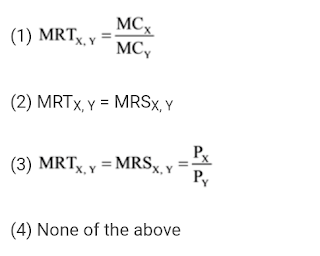STATISTICS MCQs
1.A measure of dispersion is always
A) Zero
B) Positive✔
C) Negative
D) Infinity
2.Which of these is a relative measure of dispersion
A) Standard Deviation
B) Variance
C) Coficient of Variation✔
D) None of these
3.The measure of dispersion is changed by a change of
A) Origin
B) Scale✔
C) Algebraic Signs
D) None
4.Mean Deviation, Variance and Stand-ard Deviation of thevalues 4, 4, 4, 4, 4, 4 is
A) 4
B) 8
C) 2
D)0✔
5.The mean deviation of the values, 18, 12, 15 is
A) 6
B) 0
C) 3
D) 2✔
6.The sum of squares of deviation is least if measure from
A) Mean✔
B) Mode
C) Median
D) Variance
7.The sum of squared deviations of a set of n values from
their mean is
A) Zero
B) Maximum
C) Least✔
D) None
8.Variance is always calculated from
A) Mean✔
B) Variance
C) Geometric Mean
D) Median
9.Lowest value of variance can be
A) 0✔
B) -1
C) 3
D) -3
10.The variance of a constant is
A) Zero✔
B) Constant
C) Normal
D) None
11.Variance remains unchanged by change of
A) Origin✔
B) Scale
C) Both
D) None of these
12. Suppose for 40 observations, the variance is 50. If all the observations are increased by 20, the variance of these increased observation will be:
A) Zero
B) Positive✔
C) Negative
D) Infinity
2.Which of these is a relative measure of dispersion
A) Standard Deviation
B) Variance
C) Coficient of Variation✔
D) None of these
3.The measure of dispersion is changed by a change of
A) Origin
B) Scale✔
C) Algebraic Signs
D) None
4.Mean Deviation, Variance and Stand-ard Deviation of thevalues 4, 4, 4, 4, 4, 4 is
A) 4
B) 8
C) 2
D)0✔
5.The mean deviation of the values, 18, 12, 15 is
A) 6
B) 0
C) 3
D) 2✔
6.The sum of squares of deviation is least if measure from
A) Mean✔
B) Mode
C) Median
D) Variance
7.The sum of squared deviations of a set of n values from
their mean is
A) Zero
B) Maximum
C) Least✔
D) None
8.Variance is always calculated from
A) Mean✔
B) Variance
C) Geometric Mean
D) Median
9.Lowest value of variance can be
A) 0✔
B) -1
C) 3
D) -3
10.The variance of a constant is
A) Zero✔
B) Constant
C) Normal
D) None
11.Variance remains unchanged by change of
A) Origin✔
B) Scale
C) Both
D) None of these
12. Suppose for 40 observations, the variance is 50. If all the observations are increased by 20, the variance of these increased observation will be:
A) 50✔
B) 70
C) 25
D) 30
13.Standard deviation is calcu-lated from the HarmonicMean(HM)
A) Always
B) Sometimes
C) Never✔
D) None of these
14.The variance of 5 numbers is 10. If each number is divided by 2, then the variance of new numbers is
A) 20
B) 5
C) 2.5✔
D) 5.5
16.If Y = −8X − 5 and SD of X is 3, then SD of Y is
A) 8
B) 3
C) 5
D) 24✔
17.The standard deviation is always than mean
deviation
A) Greater✔
B) Less
C) Equal
D) None
18.If the standard deviation of the values 2, 4, 6, 8 is 2.58,then the standard deviation of the values 4, 6, 8, 10 is
A) 0
B) 2.58✔
C) 5
D) 4.66
19.The measure of Dispersion can never be
A) Positive
B) Negative✔
C) 0
D) 1
20. If all values are same then the measure of dispersion will be:
A) 1
B) 0✔
C) Mean
D) Mode
D) None
18.If the standard deviation of the values 2, 4, 6, 8 is 2.58,then the standard deviation of the values 4, 6, 8, 10 is
A) 0
B) 2.58✔
C) 5
D) 4.66
19.The measure of Dispersion can never be
A) Positive
B) Negative✔
C) 0
D) 1
20. If all values are same then the measure of dispersion will be:
A) 1
B) 0✔
C) Mean
D) Mode


Comments
Post a Comment